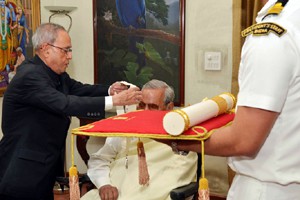
New Delhi, Mar 27: Regarded as the best Prime Minister India ever had, Atal Bihari Vajpayee on Friday conferred with Bharat Ratna, the nation’s highest civilian honour by President Pranab Mukherjee at his residence here.
In a rare departure from protocol, President Pranab Mukherjee, himself a veteran Parliamentarian, drove to Vajpayee’s residence at Krishna Menon marg in Lutyens’ Delhi to confer the honour at a simple ceremony as he is ailing and has been out of public life for about eight years.
Prime Minister from 1998 to 2004, Vajpayee has faded from public life due to age-related illness. The event was kept out of media glare.
The last picture that was taken of Vajpayee was on December 25, 2009 on his birthday, while the last public speech he gave was in 2007 in his then parliamentary constituency Lucknow. Since then the public has heard nothing from the great orator.
Vajpayee suffered a stroke in 2009 which impaired his speech. His health has been a major source of concern and those in the know say he is often confined to a wheelchair and fails to recognise people. He is said to be suffering from dementia and long-term diabetes.
Vajpayee was the first non-Congress leader to serve India for a full five-year term from 1999 to 2004. His earlier two stints at the office lasted 13 days and 13 months.
Profile: Atal Bihari Vajpayee – A statesman politician
New Delhi, Mar 27: Often described as the moderate face of BJP, charismatic Atal Bihari Vajpayee is an iconic leader whose acceptability across the political spectrum broke barriers pitchforking the saffron party to centrestage of politics in the late 90s.
An orator par excellence and known for taking bold initiatives, notable being the attempt to bridge differences in Indo-Pak relations, Vajpayee, who is lauded as a statesman politician, went far beyond his BJP’s nationalist political agenda.
It was Vajpayee’s sway that brought in 1998 new allies to BJP, once considered a virtual untouchable in view of its rightist leanings, especially after demolition of Babri Masjid in 1992.
His detractors used to call him a “mask” of the RSS, his benign smile of moderation hiding his party’s links with Hindu groups.
Undeterred by party hawks who accused him of embarking on a misdirected visit to Pakistan in 1999, Vajpayee, who is India’s longest serving prime minister outside Congress party, rode triumphantly into Lahore aboard a bus, on an initiative that was pursued by his successor Manmohan Singh.
Vajpayee’s diplomatic breakthrough was hailed as the dawn of a new era in Indo-Pak relations. But it was another story that Pakistan army undertook a covert operation to send its troops into Kargil that led to a limited conflict that Pakistan lost.
Vajpayee first became Prime Minister in 1996 after four decades in opposition. He lasted only 13 days as prime minister for lack of numbers.
The lack of a stable majority ended his second stint in power from 1998 after 13 months. His government collapsed after AIADMK supremo J Jayalalithaa withdrew her support from the coalition. He was reelected in 1999 at the head of a more stable coalition that lasted its full term.
The compulsions of coalition politics forced BJP to put on the backburner issues dear to its heart– scrapping of special status for Jammu and Kashmir, building a Hindu temple on the site of the mosque in Ayodhya and adopting a uniform civil code.
















